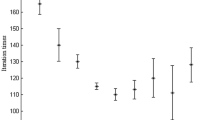Abstract
Fuzzy c-means clustering algorithm (FCM) often used in pattern recognition is an important method that has been successfully used in large amounts of practical applications. The FCM algorithm assumes that the significance of each data point is equal, which is obviously inappropriate from the viewpoint of adaptively adjusting the importance of each data point. In this paper, considering the different importance of each data point, a new clustering algorithm based on FCM is proposed, in which an adaptive weight vector W and an adaptive exponent p are introduced and the optimal values of the fuzziness parameter m and adaptive exponent p are determined by SA-PSO when the objective function reaches its minimum value. In this method, the particle swarm optimization (PSO) is integrated with simulated annealing (SA), which can improve the global search ability of PSO. Experimental results have demonstrated that the proposed algorithm can avoid local optima and significantly improve the clustering performance.



Similar content being viewed by others
References
Dunn JC (1973) A fuzzy relative of the isodata process and its use in detecting compact well-separated clusters. J Cybern 3:32–57
Bezdek JC (1981) Pattern recognition with fuzzy objective function algorithms. Plenum Press, New York
Ramathilagam S, Huang Y-M (2011) Extended Gaussian kernel version of fuzzy c-means in the problem of data analyzing. Expert Syst Appl 38:3793–3805
Kesemen O, Tezel Ö, Özkul E (2016) Fuzzy c-means clustering algorithm for directional data (FCM4DD). Expert Syst Appl 58:76–82
Verma H, Agrawal RK, Sharan A (2016) An improved intuitionistic fuzzy c-means clustering algorithm incorporating local information for brain image segmentation. Appl Soft Comput 46:543–557
Liu L, Sun SZ, Yu H, Yue X, Zhang D (2016) A modified Fuzzy C-Means (FCM) Clustering algorithm and its application on carbonate fluid identification. J Appl Geophys 129:28–35
Li X, Song J, Zhang F, Ouyang X, Khan SU (2016) MapReduce-based fast fuzzy c-means algorithm for large-scale underwater image segmentation. Future Gen Comput Syst 65:90–101
Ban OI, Ban AI, Tuşe DA (2016) Importance–performance analysis by fuzzy C-means algorithm. Expert Syst Appl 50:9–16
Maity SP, Chatterjee S, Acharya T (2016) On optimal fuzzy c-means clustering for energy efficient cooperative spectrum sensing in cognitive radio networks. Digit Signal Process 49:104–115
Zhang L, Pedrycz W, Lu W, Liu X, Zhang L (2014) An interval weighed fuzzy c-means clustering by genetically guided alternating optimization. Expert Syst Appl 41:5960–5971
Pimentel BA, de Souza RMCR (2014) A weighted multivariate Fuzzy C-Means method in interval-valued scientific production data. Expert Syst Appl 41:3223–3236
Sabzekar M, Naghibzadeh M (2013) Fuzzy c-means improvement using relaxed constraints support vector machines. Appl Soft Comput 13:881–890
Silva Filho TM, Pimentel BA, Souza RMCR, Oliveira ALI (2015) Hybrid methods for fuzzy clustering based on fuzzy c-means and improved particle swarm optimization. Expert Syst Appl 42:6315–6328
Ding Y, Fu X (2016) Kernel-based fuzzy c-means clustering algorithm based on genetic algorithm. Neurocomputing 188:233–238
Zainuddin Z, Pauline O (2015) An effective fuzzy C-means algorithm based on symmetry similarity approach. Appl Soft Comput 35:433–448
Adhikari SK, Sing JK, Basu DK, Nasipuri M (2015) Conditional spatial fuzzy C-means clustering algorithm for segmentation of MRI images. Appl Soft Comput 34:758–769
Tang C-L, Wang S-G (2010) Adaptive Fuzzy Clustering Model Based on Internal Connectivity of All Data Points. Acta Automatica Sinica 36:1544–1556
Zhou K, Fu C, Yang S (2014) Fuzziness parameter selection in fuzzy c-means: the perspective of cluster validation. Sci China Inf Sci 57:1–8
Author information
Authors and Affiliations
Corresponding author
Ethics declarations
Conflict of interest
We declare that no conflict of interest exits in the submission of this manuscript, and the manuscript is approved by all authors for publication.
Rights and permissions
About this article
Cite this article
Wu, Z., Wu, Z. & Zhang, J. An improved FCM algorithm with adaptive weights based on SA-PSO. Neural Comput & Applic 28, 3113–3118 (2017). https://doi.org/10.1007/s00521-016-2786-6
Received:
Accepted:
Published:
Issue Date:
DOI: https://doi.org/10.1007/s00521-016-2786-6




